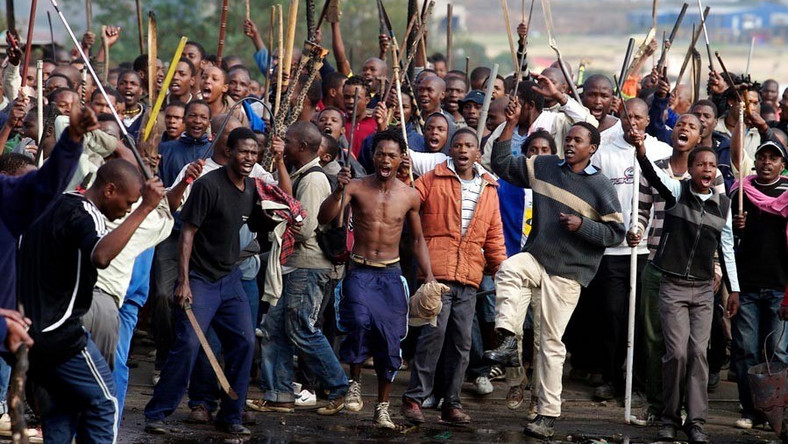
Does South Africa Bear any International Responsibility for the Xenophobic Attacks by its Citizens on other African Nationals?
The Law of State Responsibility is the branch of Public International Law that regulates the determination of the legal liability of a state for internationally wrongful acts committed against another state or an international legal person.
To be liable under this body of rules, it must be shown that the impugned acts are (a) attributable to the respondent state; and (b) that the acts violate international legal obligations binding on the respondent state at the time of their commission.[1]
One can hardly dispute that the xenophobic acts of violence that have occurred in South Africa in the last few days infringe various human right norms in the African Charter, the Universal Declaration of Human Rights and other human right instruments that are binding on South Africa. The pictures and videos circulating in the media are evidence prima facie violations of the rights to life, liberty, bodily integrity and property of the victims of the attacks. Thus, the question whether the xenophobic acts violate South Africa’s extant international obligations, particularly in the area of human rights, can be answered in the affirmative, at least tentatively.
That leaves the first question of whether the xenophobic acts are attributable or imputable to the Republic of South Africa. Generally, for
What this means, from the foregoing, is that acts of private persons done in their private capacity are not “acts of the state” and therefore do not form the basis of international liability of the state. There are however exceptions. The general “immunity of a state” from liability for acts of private persons is removed if it can be shown that the private persons were agents of the state either by way of exercising elements of governmental authority (i.e., public or regulatory functions)[4] or were acting under the direction, instructions or control of the state.[5]
The immunity is also removed if by its conduct (e.g., public statements by government officials praising or endorsing the acts) the state can be said to have adopted the wrongful acts of the private persons.[6] State responsibility for wrongful acts of private persons also attaches when the state has failed in the exercise of its due diligence obligation regarding the conduct of private individuals.[7] The due diligence obligation requires the state to utilize its security and intelligence resources to anticipate and prevent acts of private persons that may breach the state’s international obligations. If the wrongful private acts were probably spontaneous or caught the state unawares, there still exists for the state a continuing due diligence obligation to restore order, find the perpetrators, prosecute them to the fullest extent of the law and offer assurances of non-repetition to the injured state(s) or other international legal person, as the circumstance may require. Consequently, what is otherwise a private act may be translated into an “act of the state” for which a respondent state is liable if the state has adopted the private acts or failed to exercise its due diligence obligation.
Now, since the persons engaged in the xenophobic acts in South African are not state organs (officials) or state agents under relevant rules of state responsibility, the liability of South Africa for the xenophobic acts falls to be determined under the last two heads of attribution, namely, adoption by a state of the acts of private persons or the failure of a state to exercise due diligence.
To consider South Africa to have adopted the acts of the xenophobic mobs requires a high degree of proof that is not lightly attained. There must be evidence of statements or other conduct by high ranking state officials that either support, endorse or praise the acts of the mobs, probably, coupled with official inaction or unwillingness to punish the perpetrators or a sham legal proceeding that only serves to shield them.[8] Similarly, failure of due diligence requires proof that the government knew or ought to have known about the likely occurrence of the xenophobic acts but chose to do nothing about it. Or that while the government may have been blindsided by the occurrence of the xenophobic acts, it has nevertheless failed to restore law and order including by arresting and prosecuting the perpetrators as a responsible government faced with such circumstances would do.
I make no personal judgment or determination. Having briefed the relevant legal questions, I leave you the judges of the “International Court of Public Opinion” to reach your own findings and conclusions taking into account all the relevant facts including the much-publicized statement by the South African Ambassador to Ghana on the matter.[9]
[1]International Law Commission, Draft Articles on State Responsibility for Internationally Wrongful Acts 2001, Articles 2, 12 and 13; (hereafter “ILC Draft Articles on State Responsibility”).
[2]ILC Draft Articles on State Responsibility, Article 4; See also The Salvador Commercial Company Case(1902) RIAA Vol. XV 467
[3]ILC Draft Articles on State Responsibility, Article 7
[4]ILC Draft Articles on State Responsibility, Article 5
[5]ILC Draft Articles on State Responsibility, Article 8
[6]ILC Draft Articles on State Responsibility, Article 11; See also United States Diplomatic and Consular Staff in Tehran Case[1980] ICJ Reports 3, para. 74
[7]See The Home Missionary Society Claim(1920) RIAA, Vol. VI 44; Pulp Mills on the River Uruguay Case[2010] ICJ Reports 14, para. 197
[8]See United States Diplomatic and Consular Staff in Tehran Case[1980] ICJ Reports 3, para. 74
[9]See Daily Graphic, ‘Xeno attacks: Create jobs for your citizens – SA High C’ssioner to African leaders’ (5 Sept. 2019)< https://www.graphic.com.gh/news/general-news/xeno-attacks-create-jobs-for-your-citizens-sa-high-c-ssioner-to-african-leaders.html>


Great submission